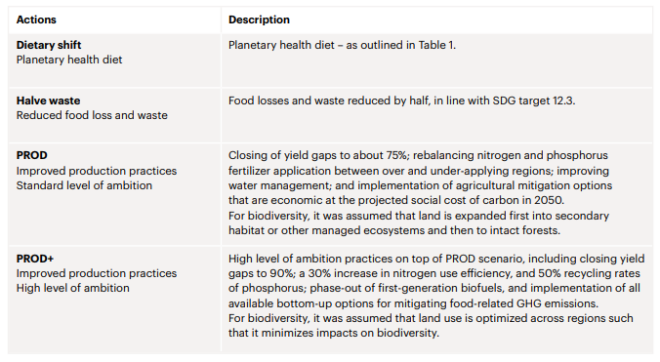A new diet report, created by the EAT-Lancet Commission on Food, Planet, Health, has been proposed as a diet that could both poor global nutrition and avert environmental disaster caused by present-day food production methods.
Key tenets of the diet include a radical change in food production, a great reduction in red meat consumption in traditional western diets, and a reduction in sugar consumption.
“Transformation to healthy diets by 2050 will require substantial dietary shifts.” said Prof. Walter Willet, one of the leaders of the commission. “Global consumption of fruits, vegetables, nuts and legumes will have to double, and consumption of foods such as red meat and sugar will have to be reduced by more than 50%. A diet rich in plant-based foods and with fewer animal source foods confers both improved health and environmental benefits.”
The main bulk of the report itself is devoted to three sections, the goal, the targets, and the strategies. The goal stated by the EAT-Lancet Commission is ‘To achieve planetary health diets for nearly 10 billion people by 2050″. The targets include and require red meat and sugar consumption to be cut in half globally, while the consumption of vegetables, pulses, fruit, and nuts, must double. This range is not universal, but geographically specific, stating that instead of halving their red meat intake, North Americans need to eat 84% less, and up their bean and lentil consumption six times. In Europe, we must reduce our red meat consumption by 77%.
The report is wise in it’s differing estimations, noting that “some populations worldwide depend on agropastoral livelihoods and animal protein from livestock. In addition, many populations continue to face significant burdens of undernutrition and obtaining adequate quantities of micronutrients from plant source foods alone can be difficult”
The introduction of the report stated that their were four scenarios that could develop in the future; win-win, win-lose, lose-win, and lose-lose. According to the scientists behind the report, win-win would prevent the deaths of 11 million people worldwide, and prevent the collapse of the natural world, which is currently under an immense amount of pressure.

Our global food system is inherently broken, with distribution favouring wealthier countries, who both consume more than they need, and waste much. There are also issues with physical production, in terms of the environmental degradation caused by overfishing, and the footprint of the meat industry. Reducing meat and dairy products, or avoiding them altogether, may be the greatest way the individual can reduce their environmental footprint.
In a report published by Springmann et al, it was stated that a 90% drop in red meat consumption and reductions in other meat categories were essential to introduce into our lifestyles in an attempt to avoid the effects of climate breakdown.
“Humanity now poses a threat to the stability of the planet,” said Prof Johan Rockström at the Stockholm Resilience Centre, Sweden, another author of the report. “[This requires] nothing less than a new global agricultural revolution.” The ‘planetary health diet’ strongly recommends only one portion of red meat per week, the size of an average beefburger, and stresses that most protein should come from plant alternatives. The steep rise in plant-based and vegan diets in the last two years has shown that, at least in western countries, this change in protein source is highly possible, and no longer a ‘radical’ idea.
Willett emphasises that this is not a diet of ‘depravation’, but rather “a way of eating that can be healthy, flavourful and enjoyable.”
To keep in line with the 2C limit of global warming set by the Paris Agreement we can assume that “world agriculture will transition toward sustainable food production, leading to a shift from land use being a net source of carbon to becoming a net sink of carbon. “

“Global food production threatens climate stability and ecosystem resilience.” said Prof. Johan Rockström, of the Potsdam Institute for Climate Impact Research & Stockholm Resilience Centre. “It constitutes the single largest driver of environmental degradation and transgression of planetary boundaries. Taken together the outcome is dire. A radical transformation of the global food system is urgently needed. Without action, the world risks failing to meet the UN Sustainable Development Goals and the Paris Agreement.”
In all, the report advocates the ‘Great Food Transformation’. “The data are both sufficient and strong enough to warrant immediate action. Delaying action will only increase the likelihood of serious, even disastrous, consequences. ” The report outlines five strategies for this immense change:
- Seek international and national commitment to shift toward healthy diets
- Reorient agricultural priorities from producing high quantities of food to producing healthy food
- Sustainably intensify food production to increase high-quality output
- Strong and coordinated governance of land and oceans
- At least halve food losses and waste, in line with UN Sustainable Development Goals
The report goes on to state that food will be the “defining issue of the 21st Century”. Richard Horton and Tamara Lucas, editors at Lancet, wrote “Civilisation is in crisis. We can no longer feed our population a healthy diet while balancing planetary resources. If we can eat in a way that works for our planet as well as our bodies, the natural balance will be restored.”
